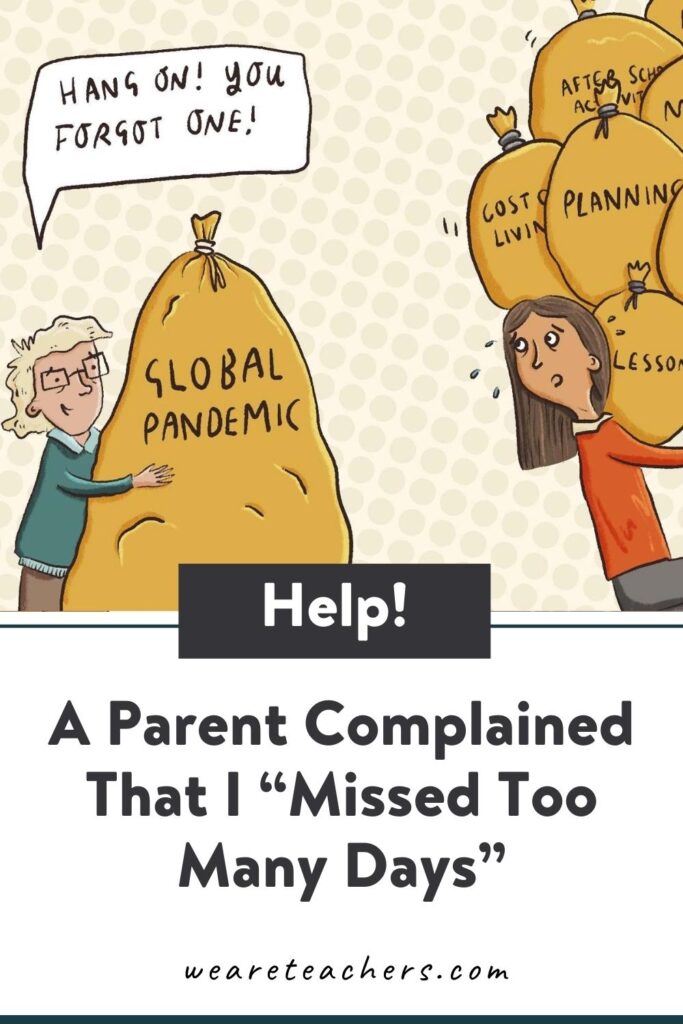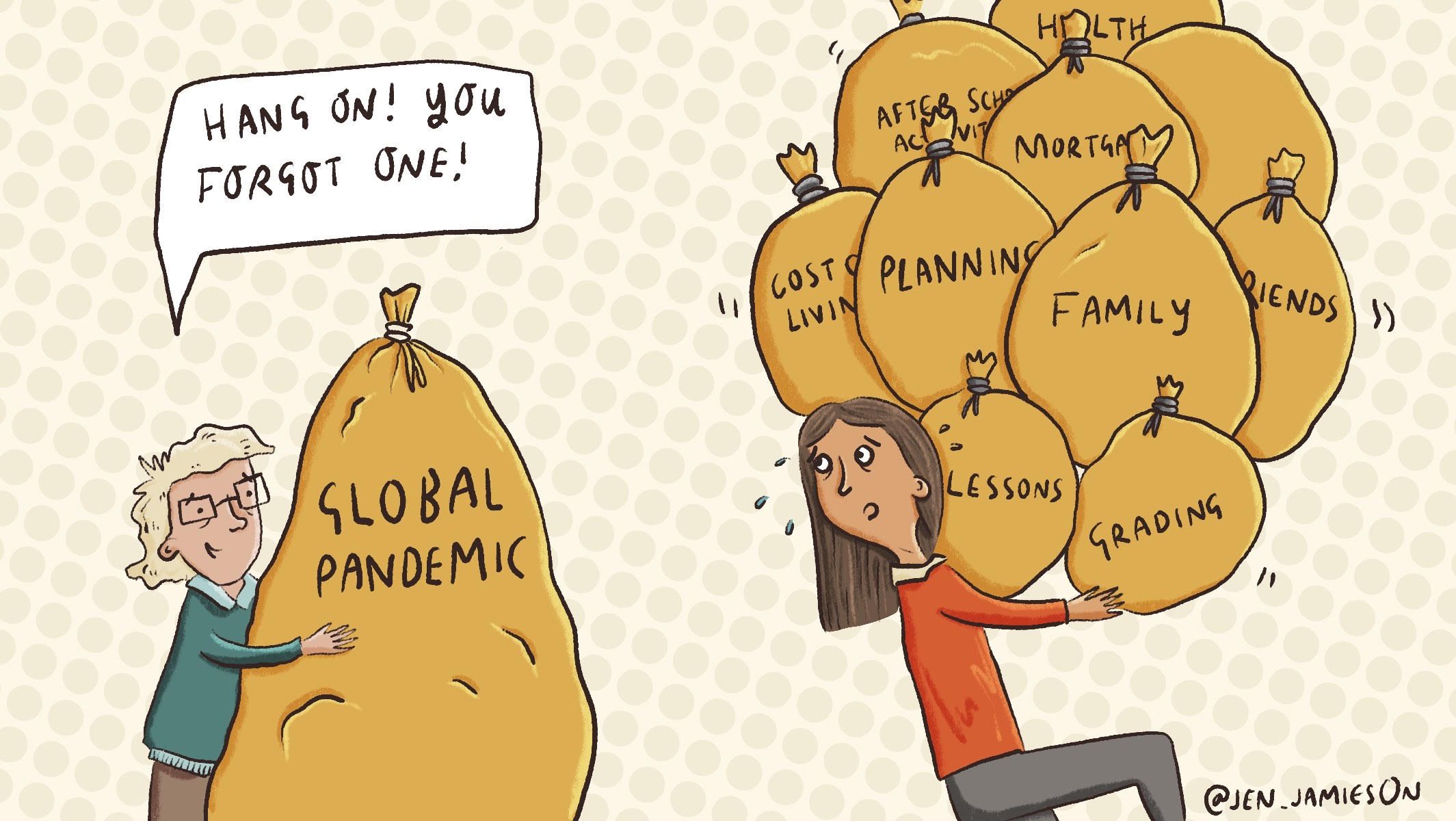Dear WeAreTeachers:
I’m a parent and first-grade teacher. Juggling these different roles and responsibilities has been a challenge, to say the least. This year, I have missed quite a bit of school. I was out for 10 days with COVID. I also needed to take care of my two young kids when they were sick. We always hear people say “family first,” but when I do take care of my family and myself, I feel self-conscious that the parents will think I’m not prioritizing my work. At pickup time, a parent commented in front of many other families that she was surprised to see me here since I’ve missed so much school. “Oh, you decided to come to work!” She even complained to the principal and said that her child’s school experience has been negatively impacted because of my absences. How do you think I should handle this? —Can’t Please Everyone
Dear C.P.E.,
Although as educators we are committed to serving others, we also need to take care of ourselves in order to be able to do our work well. You’ve heard the saying about putting your own oxygen mask on first. You were sick and you needed to take care of your family. Try not to feel apologetic about being a human! As long as you follow your absence procedures and leave decent substitute plans, you are totally fine. Even though the parent probably feels like she is advocating for her child, she crossed the line.
So many parents feel like they are experts in education just because they once attended school. Have you ever heard unfavorable comments during drop-off and pickup times? We have to remind ourselves over and over again that most people do not realize the complex, dynamic depth of knowledge, awareness, and skills teachers need to maintain day after day in order to be effective. Our work is hard, important, and so misunderstood. I had a health-care provider casually snicker and say that “Teachers have it so easy, and once they write their plans, they can go on auto-pilot. And what about the vacations!”
It sounds like you might be taking this parent’s comments a little too personally. It’s easy to do. “The real problem social perfectionists get into is that they are too hard on themselves for worrying about what other people think.” So often we set aside our own wants and needs to take care of others. Since we are in a helping profession, many of us do this far too often. This teaches your brain to value other people’s opinions more than your own. Be aware if you are turning these comments into character flaws. These snide comments the parent made do not define you.
The past few years with COVID have put a major strain on educators. Teachers have done their best to follow COVID protocols but still, so many of us have gotten sick. As a result, we have had ongoing substitute shortages. Staff absences put principals and support staff in a major scramble just about every morning. And how many of us still worry and work even when we are at home sick and have a substitute teacher? There may be times in our lives when we need a more extended time away. In that case, set up your visiting teacher for success. Don’t just write substitute plans but also write down your daily and weekly routines. It’s so common to be away from school but not REALLY be away. What if we try to let go of our insecurities and allow ourselves to focus on healing?
It’s important to talk to your principal and provide some background about what’s going on. Let your leadership see your substitute plans and the efforts you have been making to maintain continuity of learning and routines for your students. When you do meet with the parent, it may feel helpful to have another pair of eyes and ears, such as your principal. Campuses all over the nation are filled with teachers who are dealing with tricky and uncomfortable parent relationships. Even though it may not come easily at the moment, find ideas that you and the parent agree on. You might say something like, “Being sick is so challenging with work. I’m sure you can relate to how hard it is to juggle getting better while also making sure that your various roles in life are also taken care of. Thanks for understanding.”
Dear WeAreTeachers:
I teach 6th grade and I am working with my first deaf student ever. I used to think I was really good at responding to student needs, but now I realize I have a lot to learn about working with deaf students and families. My student’s parents are also deaf, so communication has been tricky because we need to set up interpreters. I’m realizing that our world and especially our classrooms are so focused on listening and speaking. I want this student to feel a part of the community. Do you have any words of wisdom? —Hearing and Humbled
Dear H.A.H.,
I can feel your desire to know better and do better. Your reflective stance is a major source of inspiration for classroom teachers and beyond. I relate big-time to your question. I also work with deaf students in my university position. I’m on a steep learning curve, but I’m also improving in every single class I teach. There are many “isms” out there. Did you know there is such a thing called audism? The dictionary definition of audism is “discrimination or prejudice against individuals who are deaf or hard of hearing.”
According to Flavia Fleischer, 4th generation Deaf scholar, and Will Garrow, audism is even more complex. They describe audism as the “diachronic and dynamic intersectional societal construct that oppresses Deaf people based on the ideological stance that humanizes specific perceived characteristics (e.g., hearing and speaking) while simultaneously dehumanizing the opposite perceived characteristics (e.g. don’t hear, don’t speak) that manifests itself within the matrix of dominance through micro-, meso-, and macro-aggressions that create both real and perceived barriers which lead to a system of over privilege for hearing people and under privilege for Deaf people.” So, take a deep breath and read that a couple more times and let it percolate and little by little sink in. Productive struggle is good for us. We favor hearing and speaking people in most of our schools and classrooms. With that said, what are some things we can do?
Keep making the effort to meet with the deaf family. Secure your interpreters and make sure they feel welcome. When working with interpreters, be sure to speak directly to your deaf student and not the interpreter. This humanizing act makes a huge difference. Provide your interpreters with some of your key resources so they can be accurate with the content and vocabulary. Ensure that they have space to stand close to you and your visual supports. Talk at a normal rate. And don’t avoid circulating around and talking to your deaf student during collaborative tasks. As you approach your student, the interpreter will begin communicating so you can understand.
Also, some instructors think it’s not that big of a deal to show a quick video even if there isn’t a closed-caption option. I’ve learned that it’s frustrating and demoralizing for the deaf student who can’t access the video. You can get your videos captioned and you can be intentionally inclusive by only choosing videos with quality captioning. Be mindful and considerate just like you would for other students’ learning accommodations. Consider looking for videos and resources that use American Sign Language (ASL) “American Sign Language is a complete, natural language that has the same linguistic properties as spoken languages, with grammar that differs from English. ASL is expressed by movements of the hands and face. It is the primary language of many North Americans who are deaf and hard of hearing and is used by some hearing people as well.”
Ask your deaf student and family what is going well with your class and what you could improve. I do that after almost all of the classes I teach and I’ve been able to make small adjustments that have a big impact. Most of all, maintain a compassionate and open mind.
Dear WeAreTeachers:
I work in a school where my admin has spent the last three years leaving our school during school days to go and speak at other events. Some of these are actual school events, but sometimes he’s speaking at other sites. Recently, he’s just been speaking to the corporate world. I overheard him say that he could easily bring in about $15,000 to $20,000 a month with his public speaking. He just announced he wrote a book based on his experiences as our principal and that he will have 10 days away for his book tour. This doesn’t feel right. If I did this as a teacher, I’d lose my job. He also took credit for a grant that I wrote. The book cites this grant as something he ushered in. At what point is this a conflict of interest? Am I overreacting? Should I confront him?—Get Over Yourself
Dear G.O.Y.,
There is a fine balance between having a leader who is involved in a variety of professional contexts and is still a major inspiration and present in their work at the site level. It’s hard to work more than a full-time position. And principals have incredibly demanding roles. I know principals who are committed to equity work who study with others, learn deeply, then apply at their school and share again to a larger audience. However, it sounds like your principal is focusing on promoting himself at the expense of your school. One big red flag is bragging about potential earnings as a public speaker.
If you feel like there is a conflict of interest, then I would recommend talking to someone in human resources. I wouldn’t take that on by yourself at the site level. That type of confrontation could backfire. How do other teachers and families feel about your administrator’s different activities? Have you noticed any grumblings? From what I can tell, it’s likely that your principal is using his school experience as a stepping stone for work that is more lucrative and provides more public attention. You might just wait it out and do your best to work under the current frustrating circumstances.
Spend some time reflecting on whether you want to confront your principal about taking credit for the grant that you wrote. I always recommend grabbing something to write with and letting your ideas out. You can make an “advantages and disadvantages” list. See what appears on the page. And don’t forget to talk to someone you trust I’m sending you a boost of courage to speak up.
Allaya Cooks-Campbell writes that “speaking up is when you communicate publicly, assertively, and honestly for the rights and needs of yourself and others. It is at the root of all social change, including within organizations. For many of us, it’s easier to advocate for others than it is to speak up for ourselves. However, when we don’t speak up for ourselves, we erode our sense of self-worth. We become engaged in a cycle of rationalizing behavior that takes us further away from our values and—ultimately—away from the person that we want to become.”
This act of owning your space and your contributions and hard work is important. Yes, there might be some repercussions and intimidation. That’s not uncommon with positional authority. But you will also build your own sense of self-efficacy, and that empowerment can outweigh the negatives. What would you say to your students if someone took credit for their ideas? You’d model and explain integrity. Now, you get to practice it!
Do you have a burning question? Email us at askweareteachers@weareteachers.com.
Dear WeAreTeachers:
I’ve been a fifth-grade teacher for the past decade, all at my current school. I’m active in the PTA and on various school committees, and parents and kids love me. I didn’t get into this job for the recognition, but I can’t pretend it doesn’t hurt to get passed over time and again for Teacher of the Year. This year, it went to the principal’s “favorite.” No surprise there, but when did Teacher of the Year become such a popularity contest?
Want more advice columns? Visit our Ask WeAreTeachers hub.


